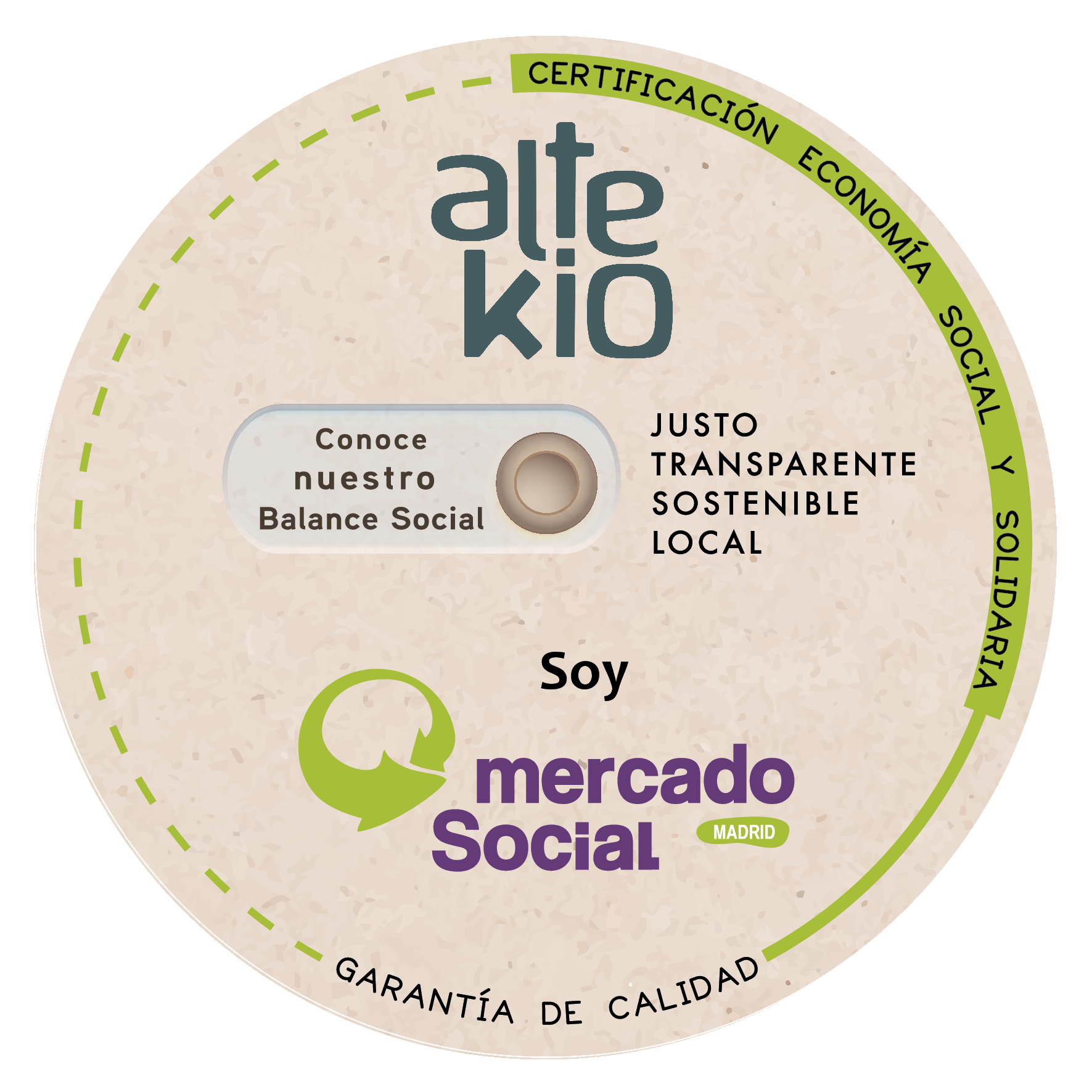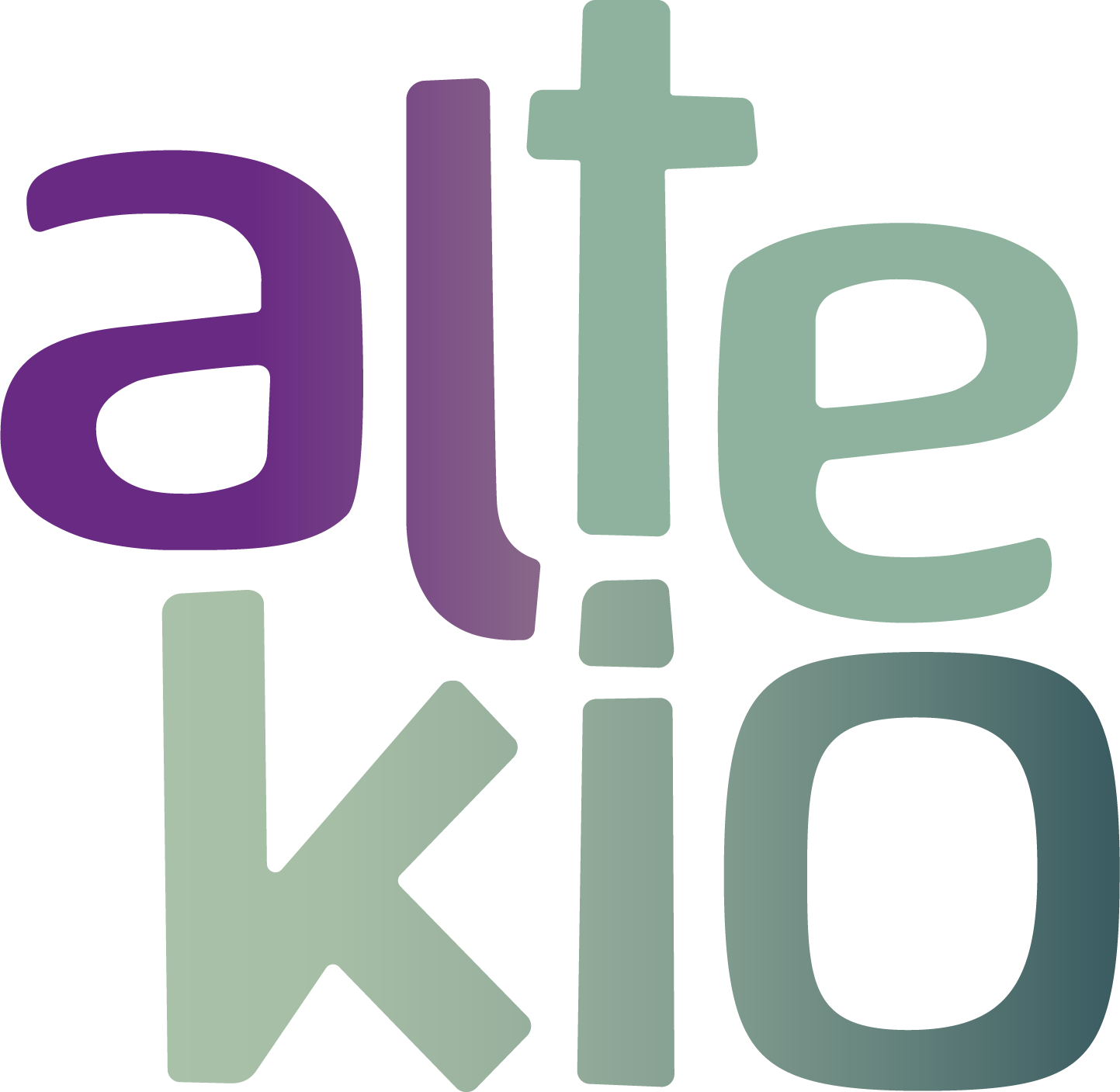The socialisation of the knowledge generated is one of the motivations that drives us to design training and educational processes. We are passionate about generating learning in the processes we design and we love to share them so that they can be useful to other people and organisations.
Therefore, we can offer specific training in the following areas.
We standardise the offer in the following modalities:
Pill
3 hours training.
Blíster
12 hours divided into 4 sessions of 3 hours each.
Módule
16 hours divided into 4 sessions of 4 hours each.
Ad-hoc
Tailor-made training, depending on the specific demand, according to the needs/expectations formulated.
Individual
Individual counselling for an analysis of specific cases, or to accompany a personal learning process in relation to this topic.
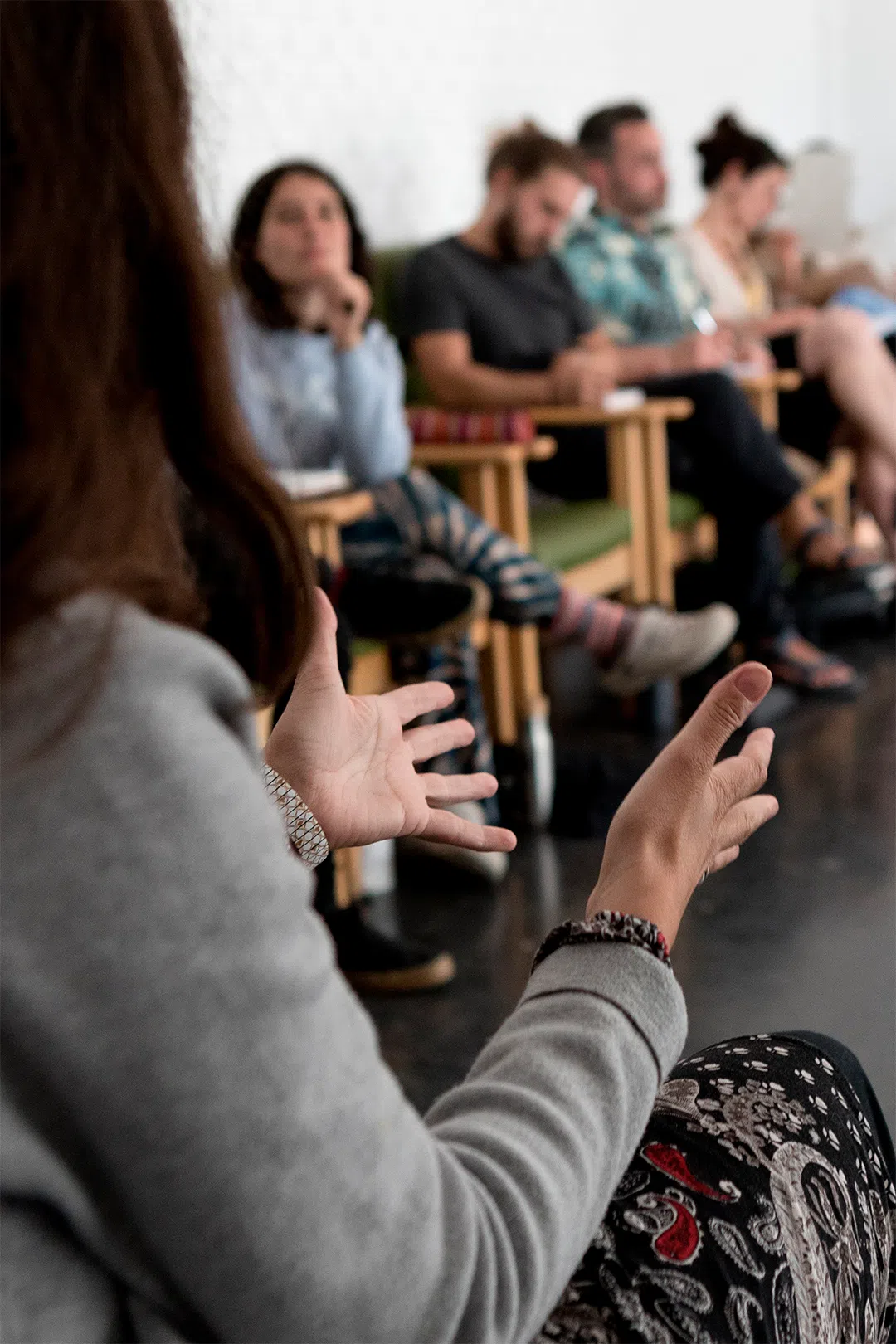
Effective and conscious communication in organisations
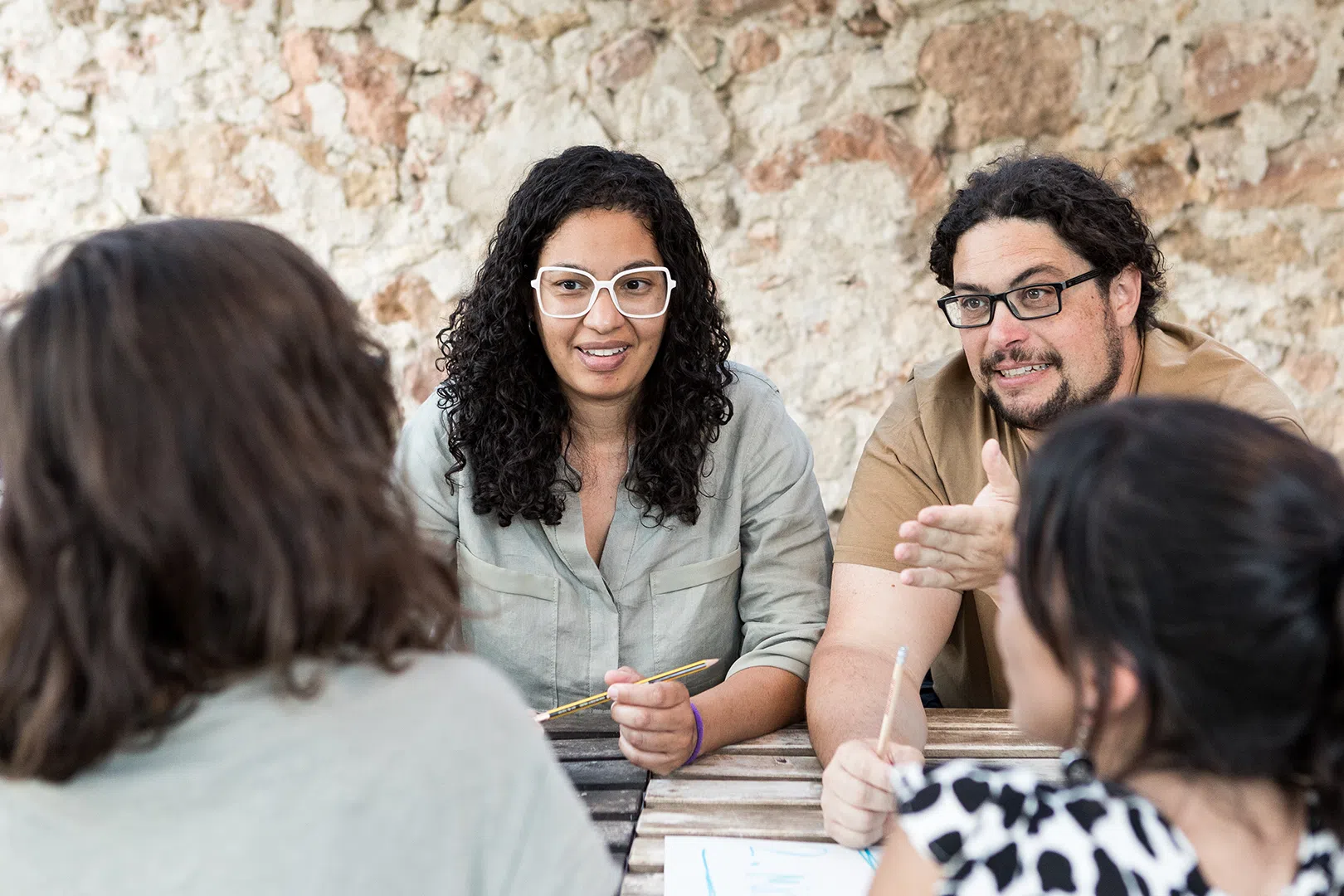
Efficient meetings and decision-making
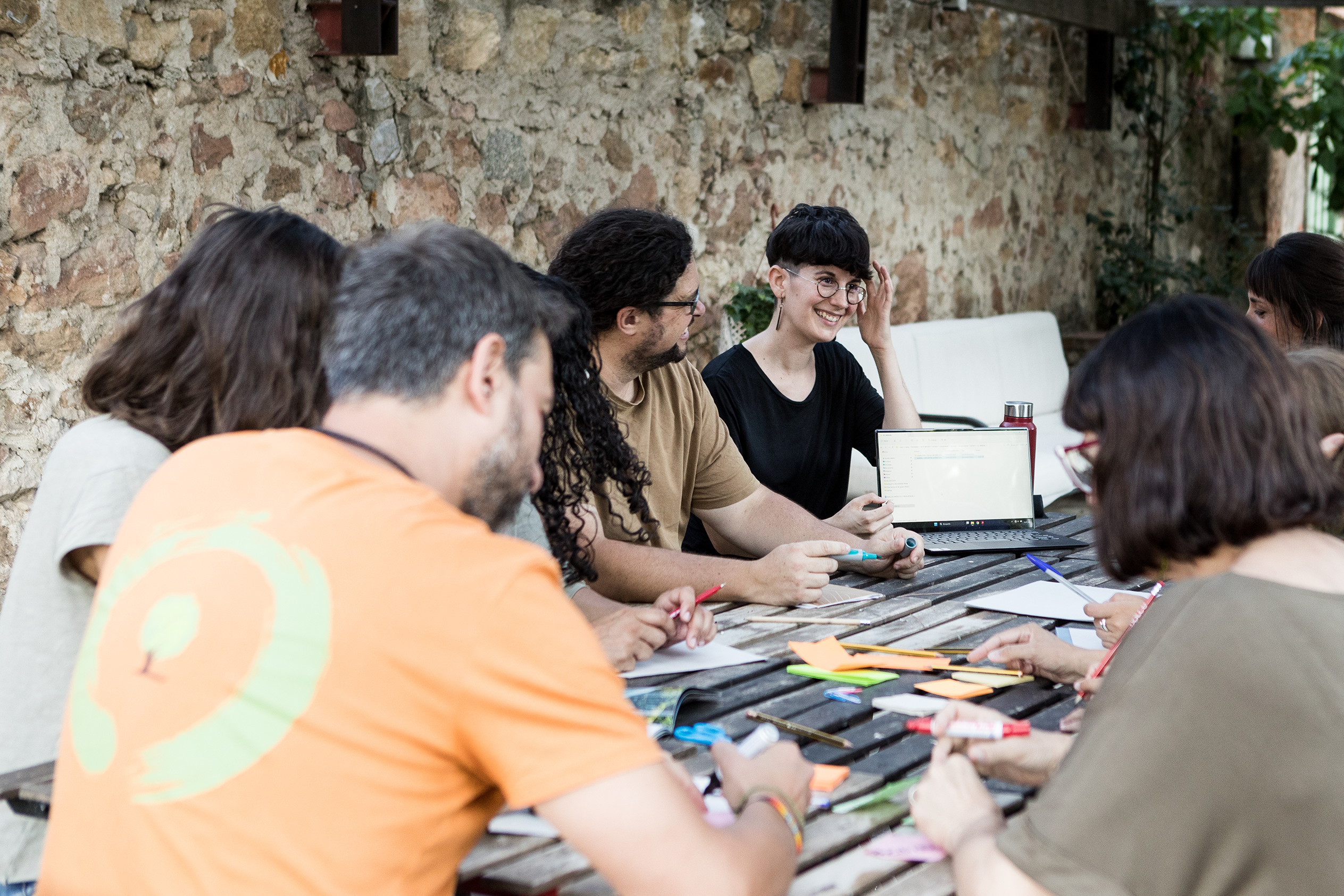
Enquiry techniques and collective intelligence (Art of Hosting)

Environmental conflict transformation
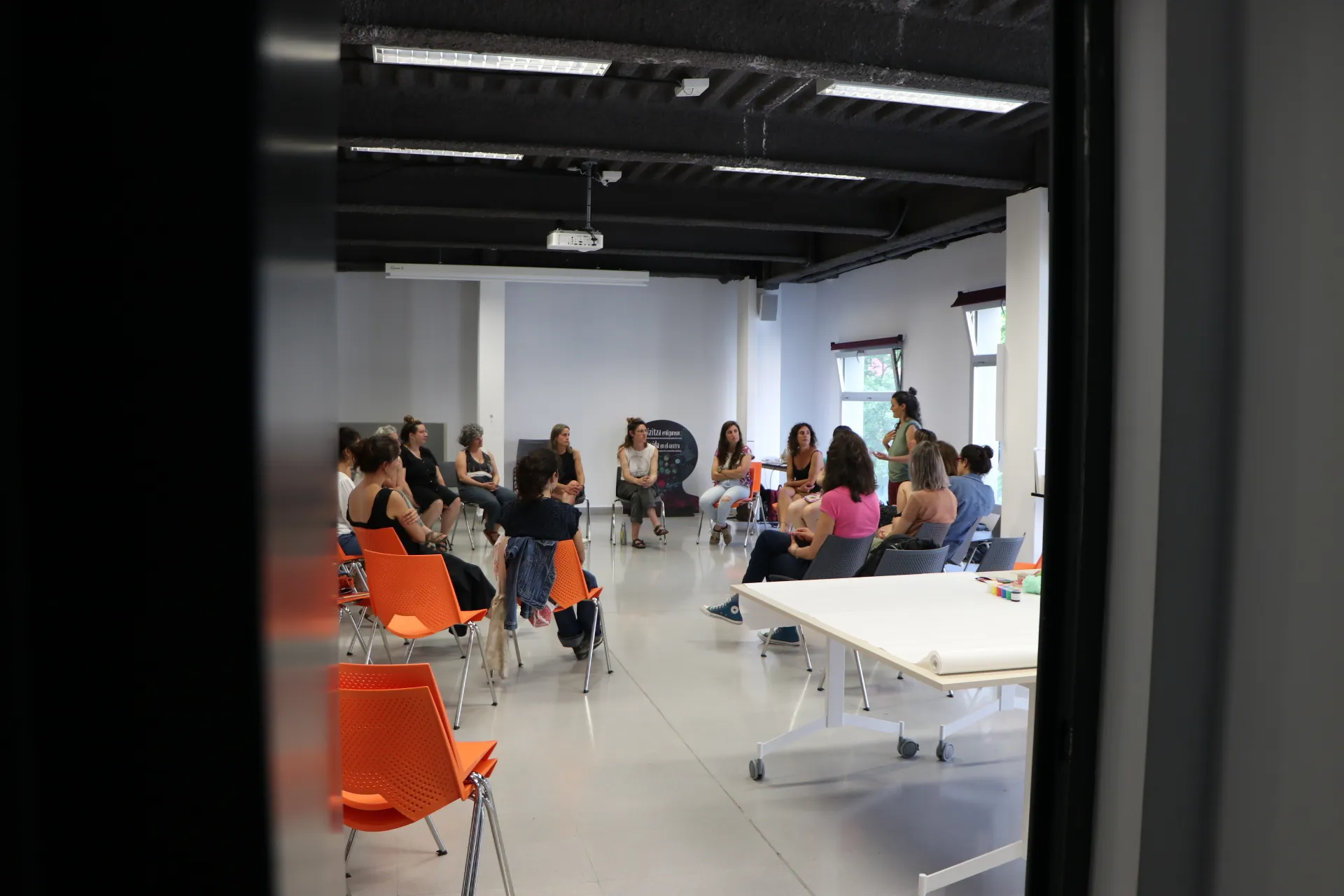
Introduction to group facilitation

Emotional management: how to include it in group life
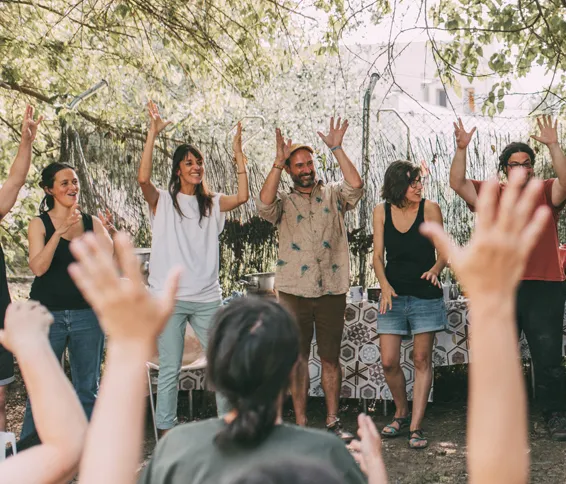
Cohesion and celebration in groups: why is it so important to include them?
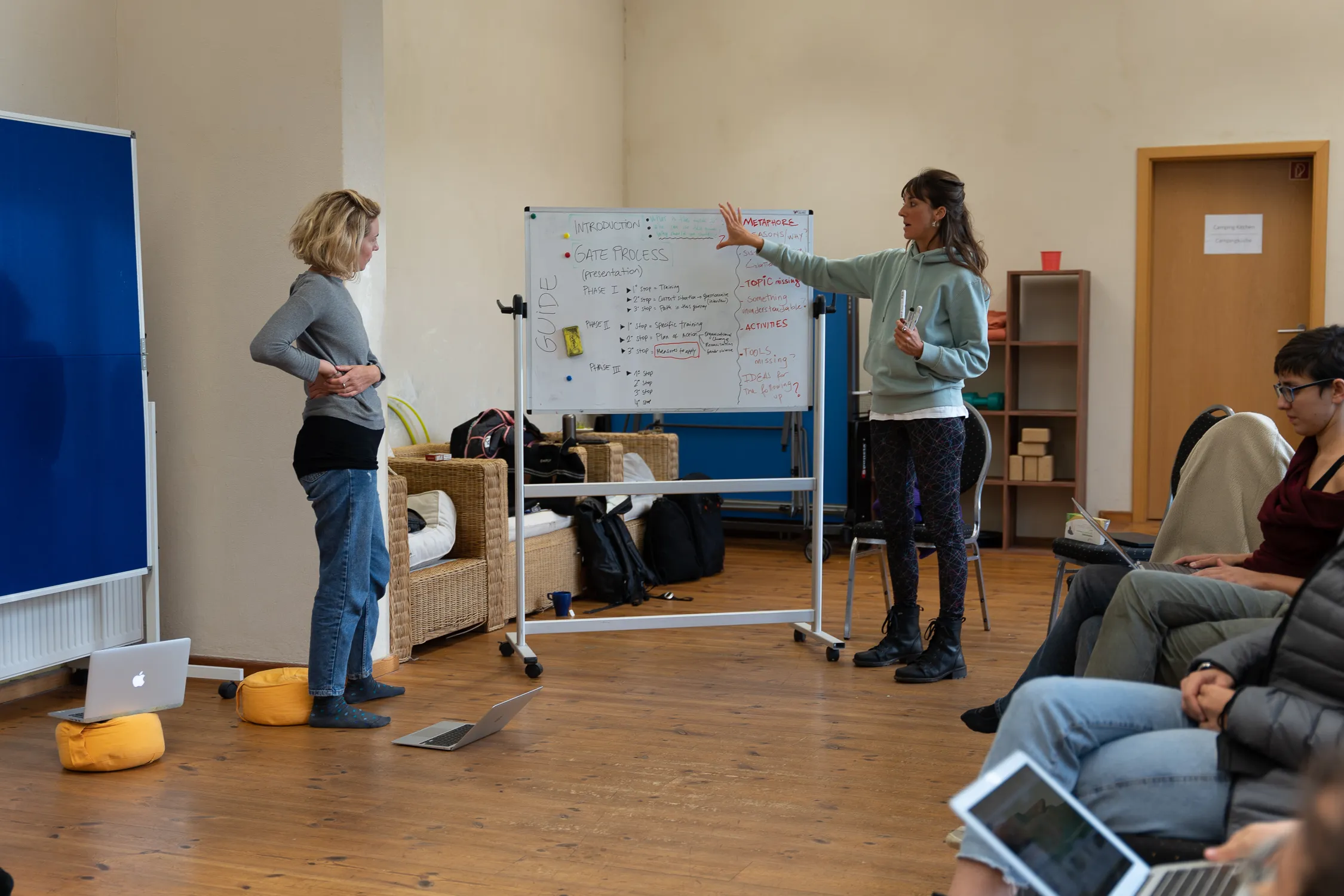
How to include a feminist perspective in the day-to-day work of organisations?
Effective and conscious communication in organisations

In group processes we encounter difficulties that are increased by the way we communicate: microviolences in language, communication barriers that hinder listening, empathy and agreement. In this course we will learn techniques and personal skills to develop effective, empathic and assertive communication, both in groups and in different areas of our lives.
General objective of this training: to develop skills for conscious, effective and deep communication and to acquire tools to support this communication in groups.
General contents:
- Foundations of beginning.
- Active Listening.
- Non-violent communication.
- Giving and receiving feedback with impact.
At the end of this training, you will have:
- Understood the main bases of communication from a facilitation perspective.
- Developed personal communication skills for conscious, deep and efficient communication.
- Developed skills to give and receive feedback with impacts (criticism, praise) in a more conscious and satisfactory way.
- Acquired concrete tools to facilitate conscious and effective communication in groups.
Aimed at: people active in working groups, participants, coordinators, managers, technicians and those who want to improve the functioning of their groups. It is also aimed at people who work with and for people or groups, social educators, teachers, etc.
Format: face-to-face, online
Efficient meetings and decision-making

Meetings are a very important part of group life. Many tasks are carried out in them and it is necessary to incorporate knowledge, attitudes and habits to improve group functioning and avoid common mistakes. In this course we will learn how to cultivate group intelligence so that meetings and decision-making in our groups become more effective, inclusive and participatory.
General objective of this training: to acquire tools for the development of formal structures in groups and organisations that are resilient and efficient and that respond to the values of the group.
General contents:
- Governance and organisational structure.
- Resilient approaches to decision-making.
- Decision-making methods: levels of acceptance, consensus and derivatives, false consensus.
- Collective decision-making:
- Axioms in decision-making.
- Factors in decision-making.
- Process and content in decision-making: steps for an effective process.
- Work techniques that encourage participation and production.
- Effective, participatory and creative meetings:
- What they are and what they are for, types of meetings.
- Main mistakes in meetings.
- Essence of effective meetings: basic elements.
- Good practices: before, during and after.
At the end of this training, you will have:
- Understood the importance of formal structures and the concept of governance as a fundamental tool for conflict prevention.
- Integrated the keys to an efficient decision-making process.
- Known the keys to the main methods of decision-making.
- Acquired the keys to the development of efficient and satisfactory meetings.
- Acquired tools to improve these structures in groups.
Aimed at: people active in groups, participants, coordinators, managers, technicians and those who want to improve the functioning and structures of their groups.
Format: face-to-face, online
Enquiry techniques and collective intelligence (Art of Hosting)

Working on creating a common vision is one of the fundamental processes for a group to mature, as it is one of the best ways to avoid conflicts. Groups should be given the importance and the necessary space so that they can investigate the issues that concern them and on which they work so that, in this way, the creative potential of a group can emerge through its collective wisdom and intelligence.
This course will work, through experimentation, with different tools and methodologies to encourage dialogue and participation within groups.
General objective of this training: to acquire the basics of collective enquiry and the specific tools to facilitate the empowerment of collective intelligence.
General contents:
- Introduction: what enquiry is, what it is for.
- Basis and principles of enquiry processes.
- How to create a space for enquiry.
- The art of asking questions
- The art of harvesting
- Techniques to facilitate dialogue and participation.
- Enquiry tools and techniques
- Art of Hosting
- World café
- Open Space
- Fishbowl
- Future scenarios
- Art of Hosting
- Enquiry practice.
At the end of this training, you will have:
- Understood the bases and logic of group enquiry.
- Acquired tools for the design of collective enquiry spaces.
- Known the application of different enquiry methodologies, their advantages and utilities.
Aimed at: people active in groups, participants, coordinators, managers, technicians, political agents, workers in the field of citizen participation and who want to improve the functioning and structures of their groups.
Format: face-to-face, online.
Environmental conflict transformation

This course aims to address the management and transformation of environmental conflicts from a systemic perspective, recognising their complexity and seeking strategies and tools to manage them. It is common to consider conflicts as a negative phenomenon, but if we broaden our view and observe their dynamics and complex evolution, we realise that conflicts function as an engine of evolution.
When we achieve a satisfactory regulation of conflicts, we strengthen the relationship of trust between the different actors and their responsibility in the search for joint solutions, as well as increasing the quality of the decision-making process.
General objective of this training: to become aware of the current reality of environmental conflicts, the common characteristics that they can present, and to study some concrete cases in order to apply conflict resolution techniques.
General contents:
- Main elements of environmental conflicts.
- Dimensions and interests in environmental conflicts.
- Conflict phases: escalation and de-escalation.
- Diagnosis: analysis of the social polarisation of the conflict.
- Development of participatory strategies for intervention in environmental conflicts.
- Intervention techniques and tools (mediation/facilitation) in environmental conflicts.
- Case studies.
At the end of this training, you will have:
- Analysed and reflected on the relationship between current conflicts and their relation to environmental issues.
- Increased their knowledge of the complexity of environmental conflicts, their effects and consequences.
- Known techniques and tools for dealing with environmental conflicts.
- Increased your motivation to go deeper and work on environmental conflicts or related issues.
Aimed at: people who may be related to environmental issues, where conflicts may possibly arise in the management, use or disposal of natural elements, either people working in the third sector in environmental matters, technical staff of public administrations (local development agents, protected areas), professionals in the field or citizens who are interested in addressing these challenges in a comprehensive manner.
Format: face-to-face, online.
Introduction to group facilitation

In this training we will identify the main functions and responsibilities of the facilitation role, as well as the ethical principles of facilitation. We will look at some of the ways to promote a smart group, creating a safe, fluid and effective space for participation; and we will also look at some of the most interesting facilitation tools and techniques for group intervention.
General objective of this training: to integrate the basics of group facilitation and the fundamental outlines for its understanding.
General contents:
- Basics of facilitation and effective work in groups.
- Complexity and systemic approach in groups: groups as complex systems.
- Group field and levels of reality.
- Structure and roles of the group field.
- Range and intersectionality.
- Functions and responsibilities of the facilitator.
- Facilitation tools and techniques.
- Group interaction.
At the end of this training you will have:
- Known the fundamental schemes for a better understanding of the complexity of groups.
- Understood the bases of group dynamics and the main roles.
- Incorporated the concept of intersectionality and its application to group dynamics.
- Understood the role of facilitation and its functions in the group.
- Integrated and experienced specific techniques and tools for group facilitation.
Aimed at: people active in working groups, participants, coordinators, managers, technicians and those who want to improve the functioning of their groups. It is also aimed at people who work with and for groups, social educators, teachers, etc.
Format: face-to-face, online
Emotional management: how to include it in group life

Emotional management is one of the four areas that we understand as fundamental for the satisfactory functioning of groups, together with decision-making, enquiry and cohesion. All the work related to relationships, conflict prevention and transformation, communication and the incorporation of emotions and their management in the work framework is framed in this space. In collective spaces, the influence of personal emotions is constant.
Many of the difficult situations we experience in groups have their origin in the resistance we feel to contact from a deeper level, to talk about and manage our emotions. Having spaces for emotional management in groups will help us to improve group health since, in addition to taking care of people, we will be accessing very useful information to apply improvements in group functioning.
General objective of this training: to get to know the space of emotional management and to learn techniques to include it in the daily dynamics of groups.
General contents:
- The emotional management space, usefulness and characteristics.
- Emotional management and conflict transformation.
- Introduction to emotion:
- What emotions are and their functions.
- Main emotions and their messages
- Recognising emotions and feelings.
- Generating increasingly safe spaces.
- Techniques and tools for emotional management in groups.
- Giving and receiving feedback with impact.
At the end of this training:
- You will learn about the emotional management space and its characteristics in groups.
- You will acquire tools to generate safer emotional management spaces.
- You will have a better understanding of your relationship with emotions and how it affects the facilitation of these spaces.
- You will learn specific tools for facilitating emotional management spaces.
Aimed at: people active in organisations, groups and collectives, participants, coordinators, managers, technicians and those who want to improve the functioning and structures of their groups.
Format: face-to-face, online
Cohesion and celebration in groups: why is it so important to include them?

The relational climate is fundamental for the satisfactory functioning of groups. To this end, it is essential to take care of the space for cohesion and celebration, a space that is usually relegated to the informal structure in groups. In this training we will understand the importance of this space and how it is related to the other fundamental spaces (enquiry, decision-making and emotional management). In addition, we will be able to acquire tools to take care of it in our groups.
General objective of this training: to learn to value, generate and incorporate the space for cohesion and celebration in groups.
General content:
- The space for cohesion and celebration as a fundamental space in a group.
- Bases, principles and types of cohesion.
- Activities and tools for working on cohesion in a group.
- Adaptation to the phase of the group, group culture and accessibility.
- Generation of group agreements and safe spaces.
At the end of this training, you will have:
- Understood the importance of the space for cohesion and celebration.
- Acquired activities and games to foster cohesion in your groups.
- Acquired tools to design your own cohesion activities adapted to the characteristics of the group, the stage they are in and the group culture.
Aimed at: people active in organisations, groups and collectives, participants, coordinators, managers, technicians and those who want to improve the functioning and structures of their groups.
Format: face-to-face, online.
How to include a feminist perspective in the day-to-day work of organisations?

Organisational culture is key to our personal and professional well-being during and after the working day. In this training we will look at how to rethink the structures, processes and relationships that are generated in organisations through feminist lenses. In a participatory and collaborative process, we will discover together which are the gender-related inequalities in our work environment, and we will work on finding solutions for a more inclusive organisational culture.
A Methodological Guide for the transition of organisations towards gender equality and other support materials are included.
General objective of this training: to transform organisations – in their structures, processes and relationships between people – towards greater gender awareness in order to promote gender equality in and outside the workplace.
General contents:
- Conceptual framework: what do we talk about when we talk about gender? Gender socialisation, patriarchal system.
- Anonymous questionnaire for diagnosis in the organisation.
- Formal and informal structures.
- Work-life balance.
- Micro-violence at work.
- Intersectionality.
- Theoretical-practical activities for awareness-raising and transformation.
- Emotional spaces to share learning, reflections and proposals.
- Action plan, monitoring and evaluation of the process.
At the end of this training, you will have:
- Known some basic concepts of gender socialisation.
- Learned about the relationship between power dynamics and violence.
- Reflected on your own experiences of gender socialisation.
- Reflected on the role you want the organisation to play in promoting equality and diversity.
- Identified aspects of the organisation that can be improved.
- Defined transformative actions and practices to promote equality and diversity in your organisation.
Aimed at: any organisation, institution, work group or team wishing to promote equality in the workplace.
Format: face-to-face, online.
Do you need more information?
You can contact our team through this form or by sending your query directly to formacion@altekio.es and we will answer you as soon as possible.


